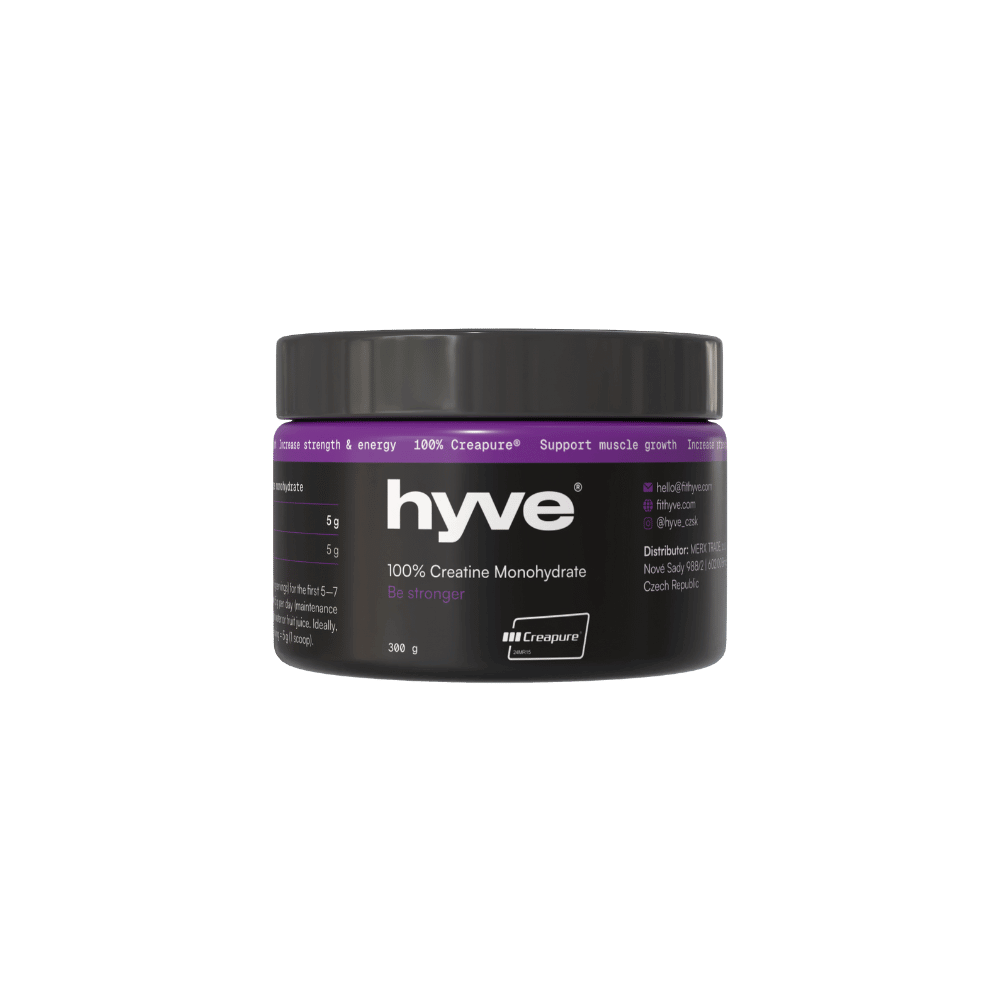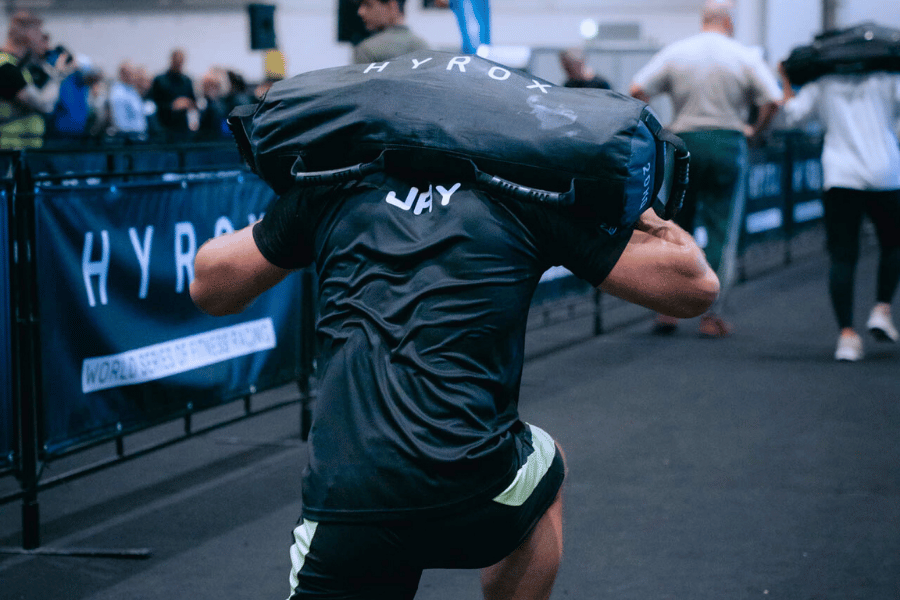
Performance Maximization
100 % Creapure®
During day
60
100% Creatine monohydrate Creapure®
Increase in strength, 300g
Product description
Do you want more strength, faster regeneration and better performance?
Creatine monohydrate is one of the most effective supplements for athletes, and hyve Creatine Monohydrate Creapure® offers superior purity and bioavailability. It supports explosive power, improves ATP regeneration and can help delay muscle fatigue - ideal for strength, interval and endurance sports.
- The purest form of creatine with Creapure® certification
- For harder and longer training, increasing strength, energy and explosiveness
- Increased regeneration and growth of muscle mass
- Ideal for performance athletes
Recommended use
Composition
Other
A suitable combination
Order by 6:00 PM - delivery tomorrow
Payment by Apple pay, Google pay and card
Satisfaction guarantee
Performance Maximization
100 % Creapure®
During day
60

100% Creatine monohydrate Creapure®
More power. In every repetition.
Higher performance
Strength, repetition, endurance.
Increase muscle strength and improve performance during repeated high-intensity exercise
Support natural muscle growth
More volume. No compromises.
It promotes hydration of muscle cells and promotes the growth of muscle mass.
Faster ATP regeneration
More energy where you need it most.
Supports ATP resynthesis during maximum exertion – for explosive performance right from the start.
More power where you need it most
hyve Creatine Monohydrate Creapure® will give your muscles extra power. It increases performance, supports rapid ATP regeneration and helps you handle more repetitions during every training and competition.

Scientifically proven performance support
Creatine monohydrate is among the TOP 5 dietary supplements recognized by the International Olympic Committee for its scientifically proven ability to improve overall athletic performance. Specifically, creatine will help you:
- Increased strength and performance – Creatine helps maintain sufficient ATP, allowing for more intense and longer training
- Faster Recovery – Helps restore muscle phosphocreatine faster, reducing recovery time between sets and workouts
- Muscle Growth Support – Increasing muscle cell hydration can stimulate anabolic processes leading to muscle growth
- Delayed muscle fatigue – Creatine helps maintain high performance during repeated explosive exercise

What is creatine and what are its other benefits?
Creatine is a naturally occurring substance in the human body that is stored in the muscles in the form of phosphocreatine. Its main function is the rapid regeneration of ATP (adenosine triphosphate), which provides energy for many processes in cells (such as muscle contraction), which is essential for short-term, intense performance.
Research shows that creatine may have not only physical but also cognitive benefits because it is involved in the brain's energy metabolism. This may be beneficial for athletes requiring quick decision-making and mental toughness.

100% Creatine Monohydrate Creapure®
100% Creatine Monohydrate Creapure® – the purest form of creatine produced in Germany with an emphasis on maximum quality, purity and safety. Supported by dozens of clinical studies and proven by thousands of athletes around the world. No additives. No compromises. Just pure performance.
Further information
Be stronger.
Creatine Monohydrate is not just another creatine
It was created for everyone who wants to support their performance in a scientifically proven way. It increases muscle creatine and phosphocreatine stores, accelerates ATP regeneration and allows you to train longer, harder and with higher intensity.
Creatine and phosphocreatine stores
The total amount of creatine in the muscles can be increased by up to 20% with supplementation. Approximately 60-70% of this value is made up of phosphocreatine - a key source of energy during short-term, maximal exercise. Higher phosphocreatine stores delay the onset of fatigue and improve the ability to perform repeated exercises, for example during strength training, sprinting or HIIT.
ATP regeneration during intense exercise
At high intensity, muscles use up ATP within seconds. Phosphocreatine serves as a rapid phosphate reservoir for ATP resynthesis, allowing you to continue your performance in later sets and reducing the time needed for recovery. This is especially crucial in short-rest training.
Support for muscle growth and cell hydration
Creatine increases intracellular osmolarity and promotes hydration of muscle cells. This creates an environment conducive to protein synthesis and lean mass growth. Studies show that the combination of creatine and strength training produces faster increases in strength and size than training alone.
Frequently asked questions
Get the most out of the product
Is creatine suitable for long-term use?
Yes. Research has not confirmed any negative effects of long-term use of creatine monohydrate in healthy individuals. However, it is advisable to follow the recommended dosage.
Does creatine cause water retention?
Yes, creatine increases intracellular hydration of muscle cells. This can lead to a slight increase in body weight (usually 1-2 kg), which is associated with increased muscle mass, not fat.
Is a saturation phase needed?
It is not necessary, but it will allow faster muscle saturation.
- 20 g/day for 5–6 days
- 3 g/day for 28 days
Both strategies lead to similar results – the choice depends on preferences.
Is creatine also suitable for endurance athletes?
Creatine can play a small but meaningful role in endurance sports performance – especially if the race involves changes of pace, starts, breaks or the final finish. It allows for faster ATP resynthesis, helps maintain performance during short, intense bursts, and may improve recovery by reducing oxidative stress and post-exercise inflammation. Creatine also supports the resynthesis of muscle glycogen, a key source of energy for endurance performance.
Creatine weight gain (typically 1–2 kg) can be a disadvantage in weight-bearing running events, but in sports such as cycling or swimming this effect is not detrimental. For runners, creatine may be useful during a period of volume training or to support adaptation to strength training. From a practical perspective, it is recommended to discontinue creatine approximately 6 days before a race to allow for weight loss through loss of water retention and possible improvement in race times.
What sports is creatine suitable for?
Creatine is most beneficial for athletes who engage in short-term, intense activities and repeated performances with short breaks. It supports rapid ATP production, increases strength and performance, and accelerates regeneration.
Studies show that creatine can also significantly help endurance athletes in key racing situations, such as starts, changes of pace or final finishes. It is especially suitable for:
Power and explosive sports
– weightlifting, strength training, CrossFit
– sprints, jumps, throws
Team and interval sports
- football, hockey, basketball, rugby
- sports with frequent changes in intensity and short recovery
Endurance sports with variable pace
- cycling and triathlon: support for escapes and finishes
- Rowing and swimming: improving performance in the final stages
- medium-distance runs: e.g. 800 m, 1500 m
- long distances (half marathon, marathon, ultra): suitable for preparation, but it is recommended to stop about 28 days before the race due to weight loss and water retention
How long does it take after stopping creatine for weight gain caused by water retention to disappear?
Weight gain after creatine supplementation is mainly due to water retention in muscle cells due to the increased concentration of creatine. According to a study by Hultman et al. (1996), this increased creatine level gradually returns to its original values within four weeks after discontinuation. This is also associated with a gradual loss of body weight - this is not an immediate effect, but a gradual return to the original weight over a period of several weeks.
How does science confirm the effects of Creatine monohydrate?
Creatine and endurance performance
Hultman E, Söderlund K, Timmons JA, Cederblad G, Greenhaff PL. Muscle creatine loading in men. J Appl Physiol. 1996;81(1):232–237. doi:10.1152/jappl.1996.81.1.232.
Engelhardt M, Neumann G, Berbalk A, Reuter I. Creatine supplementation in endurance sports. Med Sci Sports Exerc. 1998;30(7):1123–1129. doi:10.1097/00005768-199807000-00019.
Thompson CH, Kemp GJ, Sanderson AL, Dixon RM, Styles P, Taylor DJ, Radda GK. Effect of creatine on aerobic and anaerobic metabolism in skeletal muscle in swimmers. Br J Sports Med. 1996;30(3):222–225. doi:10.1136/bjsm.30.3.222.
van Loon LJ, Murphy R, Oosterlaar AM, Cameron-Smith D, Hargreaves M, Hawley JA. Creatine supplementation increases glycogen storage but not GLUT-4 expression in human skeletal muscle. Clin Sci (Lond). 2004;106(1):99–106. doi:10.1042/CS20030143.
Nelson AG, Arnall DA, Kokkonen J, Day R, Evans J. Muscle glycogen supercompensation is enhanced by prior creatine supplementation. Med Sci Sports Exerc. 2001;33(7):1096–1100. doi:10.1097/00005768-200107000-00011.



